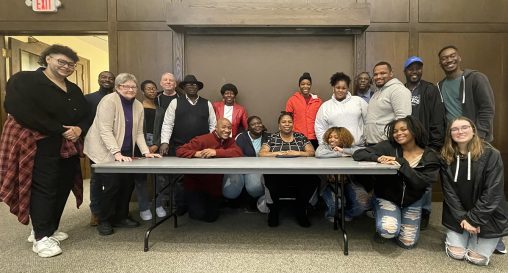
Students from Wright State, Central State and Sinclair Community College will participate in the Civil Rights Pilgrimage bus tour in Ohio and Kentucky.
Wright State University’s civil rights pilgrimage bus tour will return this spring, with three differences from last year: It’ll be one day, include more international students because of a special guest speaker, and be in collaboration with a historically black university.
“The trip will be shorter, and with the quality of the speakers in person that we’ll have will deliver a powerful message,” said Tracy Snipe, Ph.D., professor of political science at Wright State’s School of Social Sciences and International Studies. “It’s not a pilgrimage just about the past. It’s not just about tragedy. It’s about the triumphs of our struggles.”
The Civil Rights One-Day Pilgrimage Spring 2024 will take place on Friday, April 12. Two buses of students and academic representatives will go to Miami University in Oxford, Covington, Kentucky, Cincinnati, Dayton and return to the Dayton Campus around 7 p.m.
The trip costs $45 for students and $75 for faculty, staff and others. Because of limited seating, the deadline to register is Feb. 20. To register, email Snipe at tracy.snipe@wright.edu.
Snipe organized a similar two-day pilgrimage last spring that included stops in Northeast Ohio. The theme was based on his class, The Roots of the Civil Rights Movement in the Midwest and the Heartland.
This year’s trip is an outgrowth of his current class, Civil Rights Pilgrimage. This year, former Wright State employee Hazel Rountree will provide specialized support.
Each stage of this year’s trip has a theme. For breakfast, it’s “Let Freedom Ring.” The program will begin at 8 a.m. in the Student Union and will include performances by Wright State’s Collegiate Choral Ensemble with Nathan Nagir, D.M.A., director of choral studies, singer-songwriter Shirley Murdock and poet Sierra Leone. Local artist Bing Davis will arrange a visual display.
The program also includes a screening of a short animated film by Junifer Hall of Gary, Indiana, on how the holiday marking the birthday of the Rev. Martin Luther King Jr. became law.
Around 9:30 a.m., attendees will board buses for the ride to Miami University in Oxford, for the second stage, with the theme “Freedom Summer, Revisited.” Oxford is the site of the former Western College for Women, where in 1964 about 800 volunteers for the civil rights initiative called Freedom Summer were trained. Three of the volunteers were killed for their activism.
Christa Agiro, Ph.D., professor of education and English at Wright State, will serve as the facilitator for a panel slated to include virtual lectures by Sarah Collins Rudolph and Junie Collins Williams, survivors of the 16th Street Baptist Church bombing, and in-person presentations by Rebekkah Mulholland, Ph.D., of California State University–Sacramento and Mother Emanuel church member Blondelle Gadsden, whose sister, Myra Thompson, was one of the “Emanuel 9.” The panel may also include past participants involved with various aspects of training for Freedom Summer.
Following lunch, the group will head for Covington for stage three with the theme “Gateway to Freedom,” referencing the Underground Railroad.
The group will stop at a site honoring author and abolitionist Harriet Beecher Stowe and at a historical marker for Margaret Garner, a runaway slave who in 1856 killed her daughter to keep the child out of slavery. State Rep. Willis Blackshear Jr., who earned his bachelor’s degree in political science from Wright State in 2019, will share his report in Kentucky.
The group then rides to Cincinnati to visit the Black Music Walk of Fame.
The final stage’s theme is “Sounds of Freedom,” with stops at the Second Chance Ministries in Dayton, Paul Laurence Dunbar House and at a sculpture designed by Michael Bashaw, “I Can Make You Dance!” Various presenters will include Bashaw and Shirley Murdock. The Omega Baptist Church Performing Arts Ministry’s liturgical ensemble may also present a brief dance at Second Chance.
The trip will also include special guest Tushar Gandhi, great-grandson of the peace activist who led India to independence in 1947. Gandhi will give a virtual presentation about how his great-grandfather’s passive activism inspired King and the civil rights movement.
Gandhi visited Wright State in January to promote better health care for underserved communities.
Snipe said in part because of Gandhi’s January campus visit, more international students than ever are registered for the pilgrimage.
Also new this year is a contingent of students from Central State University and a smaller delegation from Sinclair Community College.
“It’s rare for a historically black college and predominantly white institutions to collaborate on projects of this magnitude,” Snipe said. “This is important on so many levels.”

 Walking through open doors
Walking through open doors  Adventures await
Adventures await  Wright State to expand nursing facilities to meet workforce needs and prepare more graduates for in-demand careers
Wright State to expand nursing facilities to meet workforce needs and prepare more graduates for in-demand careers  Wright State student-athletes make a lasting impact on local family with more to come
Wright State student-athletes make a lasting impact on local family with more to come  Wright State names Rajneesh Suri dean of Raj Soin College of Business
Wright State names Rajneesh Suri dean of Raj Soin College of Business 